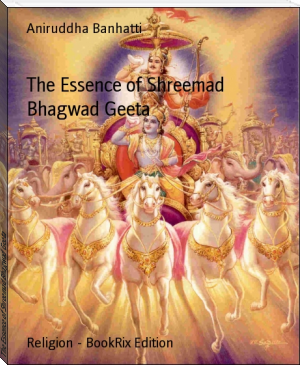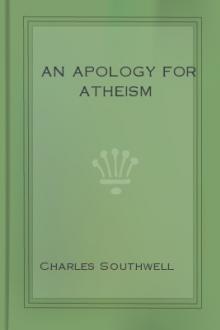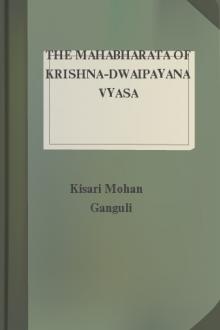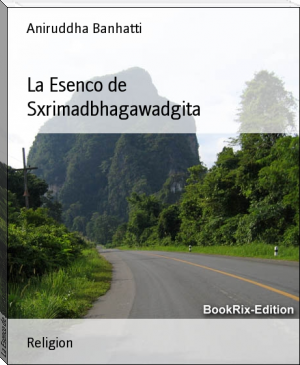The Essence of Shreemad Bhagwad Geeta - Aniruddha Banhatti (great reads txt) 📗

- Author: Aniruddha Banhatti
Book online «The Essence of Shreemad Bhagwad Geeta - Aniruddha Banhatti (great reads txt) 📗». Author Aniruddha Banhatti
The essence of
Shreemad Bhagwad Geeta
in
Simple, Everyday English
By
Aniruddha Banhatti
Introduction
Shreemad Bhagwad Geeta is a wonderful book. It is part of the great Indian epic Mahabharata. In the West, Indian mythology is not as widely known as the Greek mythology. Hence this attempt to acquaint you with a very popular text from Indian mythology.
I am not a very religious person. I am almost an atheist in my thoughts. Why almost an atheist? Because now and then, I doubt my belief in atheism, too! Because atheism is also an ‘ism’, a firm belief. And human nature, according to me, can’t tolerate any type ‘ism’ for too long. Sanskrut literature is very rich. If I awaken your curiosity about Sanskrut literature, then my job is done.
As a background, let me tell you the story of Mahabharata. I will cut short the beginning part dealing with various family trees, births of Kings and whatnot and get down to the core story of Mahabharata.
In the Kingdom of Hastinapur, Dhrutarashta and Pandu were princes, born from the same father but different mothers – Dhrutarashtra was the elder, but since he was blind from birth, Pandu became the King. Pandu had five sons, whereas Dhrutarashtra had hundred. Together, these hundred and five princes grew up and learnt all the arts and sciences princes were supposed to learn. The sons of Pandu were called Pandava and those of Dhrutarashtra were called Kaurava – the Pandava were Yudhishthir, Bheem, Arjun, Nakul and Sahadev . Duryodhan and Dusshasan were the eldest Kaurava. Yudhishthir being the eldest of the 105, Dhrutarashtra established him as the crown prince. Upon Pandu’s death, Bheeshma, an uncle of Pandu and Dhrutarashtra, looked after the Kingdom in Pandu’s name. When Yndhishthir came of age, he became the king and proved to be a very good ruler and his rising fame caused jealousy and then hatred in the minds of Kaurava. Duryodhan told his misgivings to his father Dhrutarashtra. He argued that Dhrutarashtra was elder to Pandu, but due to being blind at birth, the Kingdom was given to Pandu. Now that Pandu was dead, the sons of Dhrutarashtra were the rightful heirs to the throne and not the Pandava. Dhrutarashtra concurred and they hatched a plan together. Dhrutanashtra expressed his desire that Pandava should embark upon a pilgrimage to Varanavat where a big religious festival of Lord Shiva was to take place. Obeying his wish, Pandava started on their pilgrimage. On the way, Duryodhan conspired to burn Pandava in a house where they took shelter. But due to this conspiracy being known to them in the nick of time, they escaped. On the same night, five huntsmen and their mother also had taken shelter in the same house. Their corpses were found which made the Kaurava think that Pandava were dead. They mourned in public and rejoiced in private. All the citizens were sad and held mourning. After some months, Pandava finished their pilgrimage and returned to Hastinapur. Though he really did not want to, Dhrutarashtra divided the kingdom in two parts due to pressure from Bheeshma and from the citizens. Dhrutarashtra told Pandava, “To avoid unnecessary enmity between you and the Kaurava, I am giving half kingdom to you and half to Kaurava. You build a new capital at Khandava Prastha and Kaurava will have the capital at Hastinapur, now to be called Indraprastha”. To this the Pandava readily agreed and built a fine city at Khandava Prastha. Soon, the citizens found their rule so benevolent and just, that all the intellectuals, artists, merchants, wealthy people started migrating there, and Indraprastha, which was once a first rate kingdom, started looking lackluster in comparison. This again angered Duryodhana, and on the advice of his maternal uncle Shakuni, he challenged Pandava for gambling. Since Kings could not refuse such a challenge, the Pandava went to Indraprastha . With loaded dice and resorting to cheating, Kaurava won all the wealth of Pandava and in the last bet, they sent Pandava for twelve years of exile and one year of anonymous life. Pandava abided by their bet and went away for thirteen years, came back, and demanded back their kingdom.
Kauarava refused. Pandava said to them, “Give us five villages, we will take care of the people and live there peacefully” To which Duryodhana, the eldest Kaurava replied, “Forget five villages. We won’t give you even so much land as can be accommodated on the point of a needle.” Lord Shrikrushna, advisor of Pandava advised them to fight for their rights. Thus war was declared.
When both armies were face to face, Arjun, who was the best warrior of the Pandava, saw all his childhood friends, cousins, his teachers, his uncles and other elders standing before him as enemies. He lost all his will for battle and put his weapons on the ground. Lord Shrikrushna , his charioteer and advisor asked him the reason. As Arjun told him his misgivings about killing his near and dear, Shrikrushna urged him to go into battle as the battle was for a just cause. This advice of Shrikrushna as given to Arjun is the text known as Shrremad Bhagawad Geeta.
The advice given by Shrikrushna is applicable to all human situations, all times, present and future, and it is the essence of the philosophy of living life fruitfully and without getting confused or caught up in endless debates of right and wrong, of the existence of freewill or destiny and it elevates human life and its purpose to the highest level of realization.
Bhagwadgeeta has 18 parts. In the next lectures I shall tell you first about the contents of each part and then try to put before you my own interpretations of these, if any. The entire text translated as it is and without any commentaries makes the most beautiful and succinct reading. If this lures you to the original, my work shall be done.
Part One
Now, I shall introduce you to Geeta as it is customarily called or Bhagwadgeeta. It has 18 parts. The first part is called ‘Arjun Vishad Yoga’ or ‘The Grief of Arjun.’
The battle is about to commence on the sacred battle ground of Kurukshetra, and the blind king Dhrutarashtra wants to know what is happening there. Hence, he commands Sanjay, who has the gift of super-sight, to see what is happening at Kurukshetra, and describe it to him.
Dhrutarashtra said, “O Sanjay, assembled on the Kurnkshetra, the sacred battle ground, tell me what my people and the Pandava do.”
Sanjay said, “The King Duryodhan seeing the Pandava forces in array approached his teacher Drona and spoke thus:
Behold, O teacher, this army of the sons of Pandu, arrayed by the son of Drupada, your beloved pupil.
He took a stock of all the warriors standing in front of them and exhorted them to support him. He said: This our army protected by Bheeshma, cannot even be counted. But that Pandava army protected by Bheem is easy to count. So stationed at your posts, support Bheeshma alone, and victory is ours.
That powerful eldest of the Kurus, Bheeshma, the grand sire, in order to cheer Duryodhan, roared like a lion and blew his conch.
Various warriors blew their individual conches and the sound struck terror in the hearts of the weak.”
Sanjay said, “Then, O lord of Earth, seeing Duryodhan’s army being marshaled and the war about to begin, Arjun raised his bow and said to his charioteer, Lord Krushna, thus: Place my chariot between the two armies so that I may see those who stand here prepared for war. On this eve of battle, let me see, with whom I have to fight.
For I desire to observe those who are assembled here to fight wishing to please the evil minded Duryodhan by taking his side on this battlefield.”
Sanjay said, “Thus commanded, Hrushikesh drove the grandest chariot to a place between the two armies. Then Partha saw in both armies, grandfathers, fathers in law, uncles, cousins, their sons and grandsons, comrades and teachers and other friends as well.
Then he, the son of Kunti, seeing all his kinsmen stationed in their ranks spoke thus sorrowfully and filled with deep compassion.
Arjun said : Seeing, O Krushna, these my kinsmen gathered here eager for fight, my limbs fail me and my mouth is parched up. I shiver all over and the Gandeeva, the divine bow, slips from my hands. My skin burns. Neither, O Keshava, can I stand upright. My mind is in a whirl and I see bad omens.
Neither O Krushna, do I see any good in killing these, my own people in battle. I desire neither victory nor empire, nor yet pleasure.
Then Arjuna cited his various misgivings giving reference to scriptures and duties of humans towards each other. Arjun concluded by saying :
Alas, we are involved in a great sin. We are prepared to slay our kinsmen out of greed for the pleasures of a kingdom.
Verily, if the sons of Dhrutarashtra with weapons in hands were to slay me, unresisting and unarmed, that would be better for me.
Sanjay said, “Speaking thus in the midst of the battlefield, Arjun, casting away his divine bow and arrows, sank down on the seat of his chariot with his mind distressed with sorrow.”
Thus ends the first part named ‘The Grief of Arjun’ or ‘Arjun Vishada Yoga’.
Part Two
The second part is called ‘Sankhya Yoga’ or ‘The Sankhya Philosophy’.
Lord Shri krushna said to Arjun who sat dejected, determined not to fight the battle, “Arjun, you are a brave warrior. Such cowardice doesn’t become you. Rise and prepare to fight.”
Thence Arjun said, “We will obtain Kingdom and wealth and worldly pleasure by killing our own and our beloved teachers. But all those pleasures of Kingdom will be bloodstained. Shrikrushna, my mind is utterly confused. I do not know what I should do. Shrikrushna, I am your student. I have come to your refuge. Tell me something precise and honorable.”
Then taking the support of Sankhya Philosophy, Lord Shrikrushna said to Arjun, “Arjun, you are grieving about worthless things. The soul present in each living creature’s body cannot be killed and is indestructible. In the same way as a person abandons an old garment and puts on a new one, the soul abandons an old or dysfunctional body and enters a new body.”
Thus, explaining the transitory nature of the body, and the non-transitory or permanent nature of the soul, Shrikrushna said again, “Arjun, as death and rebirth are thus happening forever, you have no reason to grieve about them, also, you do not have to worry that you will be sinning while killing humans during war. Arjun, you have only the right over an action that you do. On the fruit of that action you have no right. Hence you abandon the thought of not doing the action, namely, fighting this war.
Second thing, for warriors and kings nothing is as honorable as fighting a just war. You enter the battle considering joy and mourning, pleasure and pain, victory and defeat as equal.”
Upon that, Arjun asked about a ‘Sthitapradnya Person’, i.e. a person who has attained a complete balance of mind. To this, Shrikrushna replied, “The





Comments (0)